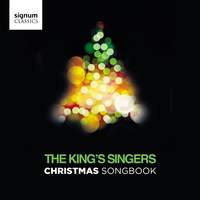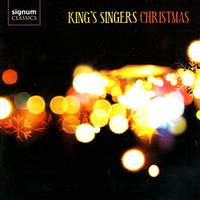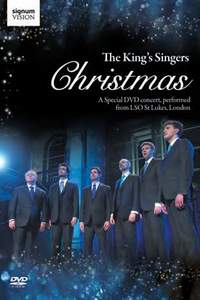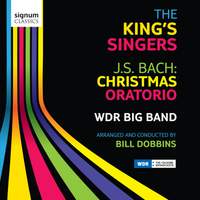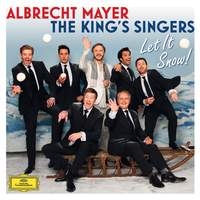Interview,
The King's Singers at Christmas
 The King's Singers, universally acclaimed as one of the world's foremost a cappella ensembles, have undergone many changes in the decades since their initial formation - with a constantly-evolving lineup and musical style - but the thread running unbroken through it all is of peerless, polished musicianship.
The King's Singers, universally acclaimed as one of the world's foremost a cappella ensembles, have undergone many changes in the decades since their initial formation - with a constantly-evolving lineup and musical style - but the thread running unbroken through it all is of peerless, polished musicianship.
Lately the King's Singers have been exploring the possibilities that jazz- and swing-inspired music offer - and their Christmas disc carries on this theme, with new arrangements of Christmas favourites both sacred and secular.
I spoke to Johnny Howard, the King's Singers' bass, about this new album and the group's starry history.
Photo credit: Andy Staples.
The King’s Singers’ sound and style has developed rather a lot over the years, and this album embodies (indulges?) what you describe as your “current penchant for swing”. Is this a direction the Singers are going to keep moving in as the membership continues to evolve?
One of the things that I love about being a King’s Singer is that our combined repertoire covers so many genres. It’s also informed by the arrangers with whom we’re collaborating, who have particular likes and fields of expertise. Alexander (Arnd) L’Estrange – a good friend of the group but also an important figure for me personally: he gave me my first ever solo in a choir when I was just eight years old – is a man with whom we’ve worked extensively. Not only did he author every arrangement on our Great American Songbook album, but he’s also written six of the pieces in our Christmas Songbook. He’s a man who loves jazz, which has of course been ideal when putting his own spin on standards made famous by luminaries like Frank Sinatra, Ella Fitzgerald and Nat King Cole. But it’s also helped us feel a lot more comfortable swinging (for want of a better word) than we ever did before. I wouldn’t say it’s something we’re actively pursuing over and above other musical styles, but it’s lovely to feel like you have another mode of performing within your bag of tricks.
Recently a number of a cappella groups have begun to rise to prominence and the genre is growing more popular – what do you think keeps your sound unique from these other groups (and have the King’s Singers ever mentored any of them)?
I suppose that the most fundamental difference is that we strive not to have to use amplification – really only in venues so large or so acoustically unfriendly (like when you’re outside) that it’s necessary. We rely on our blend, balance and attention to unifying vowel sounds (for instance) to create natural harmonics that help to transmit whatever we sing to our entire audience. Our listeners often say that The King’s Singers have a trademark sound – one that is defined by its blend, where individual voices don’t stick out. In reality, we of course want individual voices to shine – but only when it’s right, musically, for that to be the case. To use an analogy, our ideal is for the six of us to sound like one instrument playing six individual lines and bringing each one out when it’s appropriate, rather than six instruments trying to sound as one. What’s lovely is that every group has its own ‘thing’. We absolutely have worked with lots of other a cappella groups in our history – and taught quite a few famous ones. But we’re all colleagues and friends within our strange, burgeoning genre. And it’s important that we each champion our own group’s individual voice while at the same time recognising what makes other groups shine.
Many of the most popular Christmas carols and songs have been arranged innumerable times by and for various groups. What do you feel sets the L’Estrange and Rice arrangements on this album apart from the crowd?
What we love about our new recording is that it celebrates the past and looks forward to the future at the same time. These arrangements by Keith, Bertie and Arnd each resonate with us and our relationships with singing at Christmas as we’ve grown up. But they also encompass a wider musical ambit than you’ll find on most Christmas recordings. There’s traditional choral writing bundled together with some really provocative jazz harmonisation that I adore seeing side by side. And because all three of these composers have written for us so extensively, they implicitly understand our voices, our ranges, and what suits this current line of King’s Singers. Which, I think and hope, makes for a great album.
The repertoire combines the sacred and the secular, the old and the new; how did you decide what to include and what to exclude? Was there anything you wanted to feature on this album but didn’t have space for?
There’s so much good Christmas music that it was impossible to include absolutely everything we wanted to on it. We had a long list of pieces in mind as we were trying to put together our track listing, so we spoke with our arrangers to see what inspired them. What’s lovely is when an idea is put to you that you hadn’t even thought of yourself. Arnd came to us and said he’d love to write a version of The little boy that Santa Claus forgot. It’s a festive jazz standard that none of us knew, but which we all now love – which is testament to the fact that the more heads you put to something, the better the outcome is likely to be!
The King's Singers Christmas Songbook is out now on Signum Records.
Available Formats: CD, MP3, FLAC, Hi-Res FLAC
Other festive recordings from The King's Singers
A more conventional collection of Christmas classics from 2003.
Available Formats: CD, MP3, FLAC
The King's Singers in concert - featuring Christmas songs from around the world, and recorded in the atmospheric venue of LSO St Luke's, since 2004 the home of the London Symphony Orchestra.
Available Format: DVD Video
A wildly different take on Bach's festive oratorio, featuring the unique sound of the WDR Big Band.
Available Formats: 2 CDs, MP3, FLAC
The King's Singers combine with oboist Albrecht Mayer for a blend of instrumental and choral favourites - a unique musical fusion.
Available Formats: MP3, FLAC, Hi-Res FLAC


